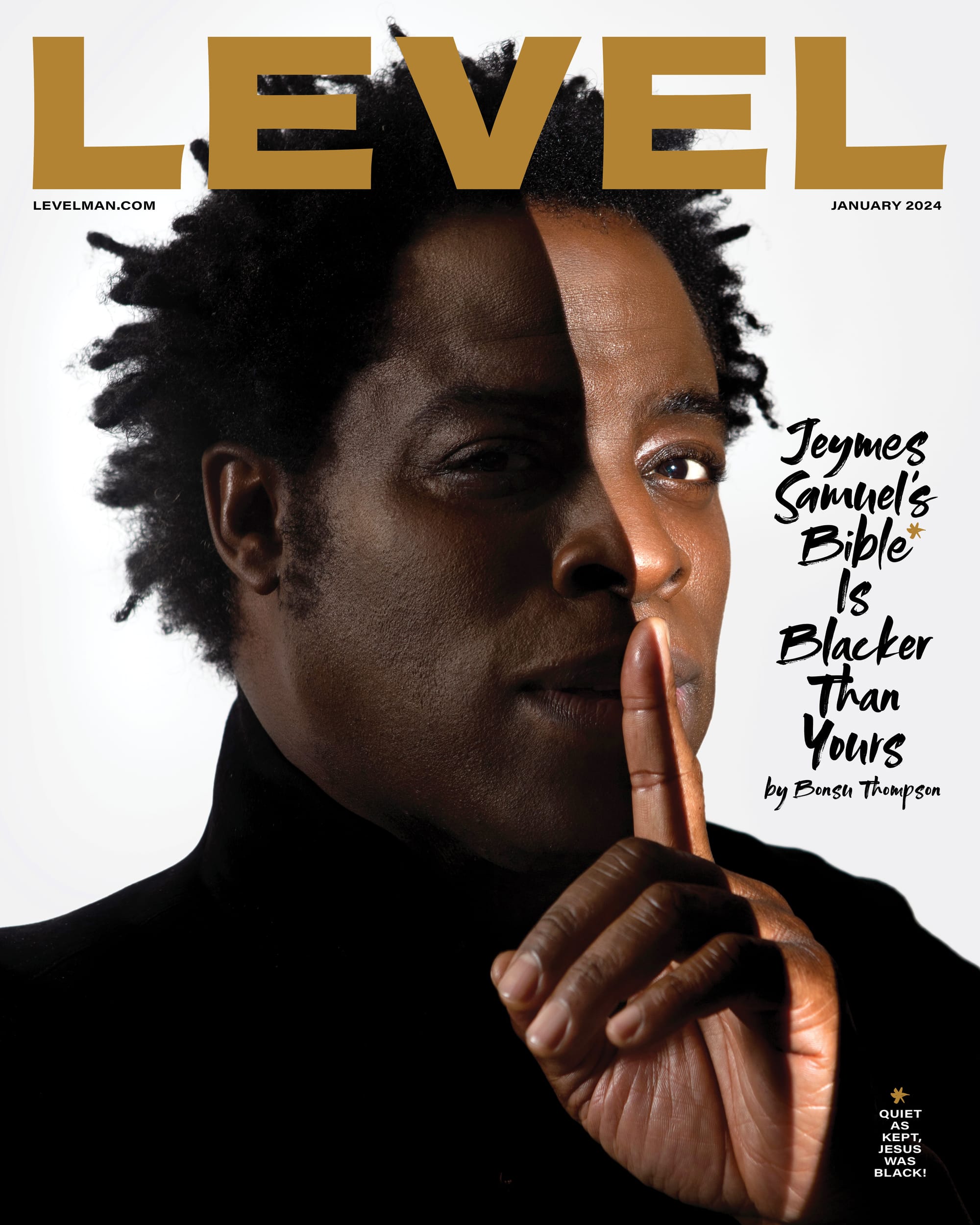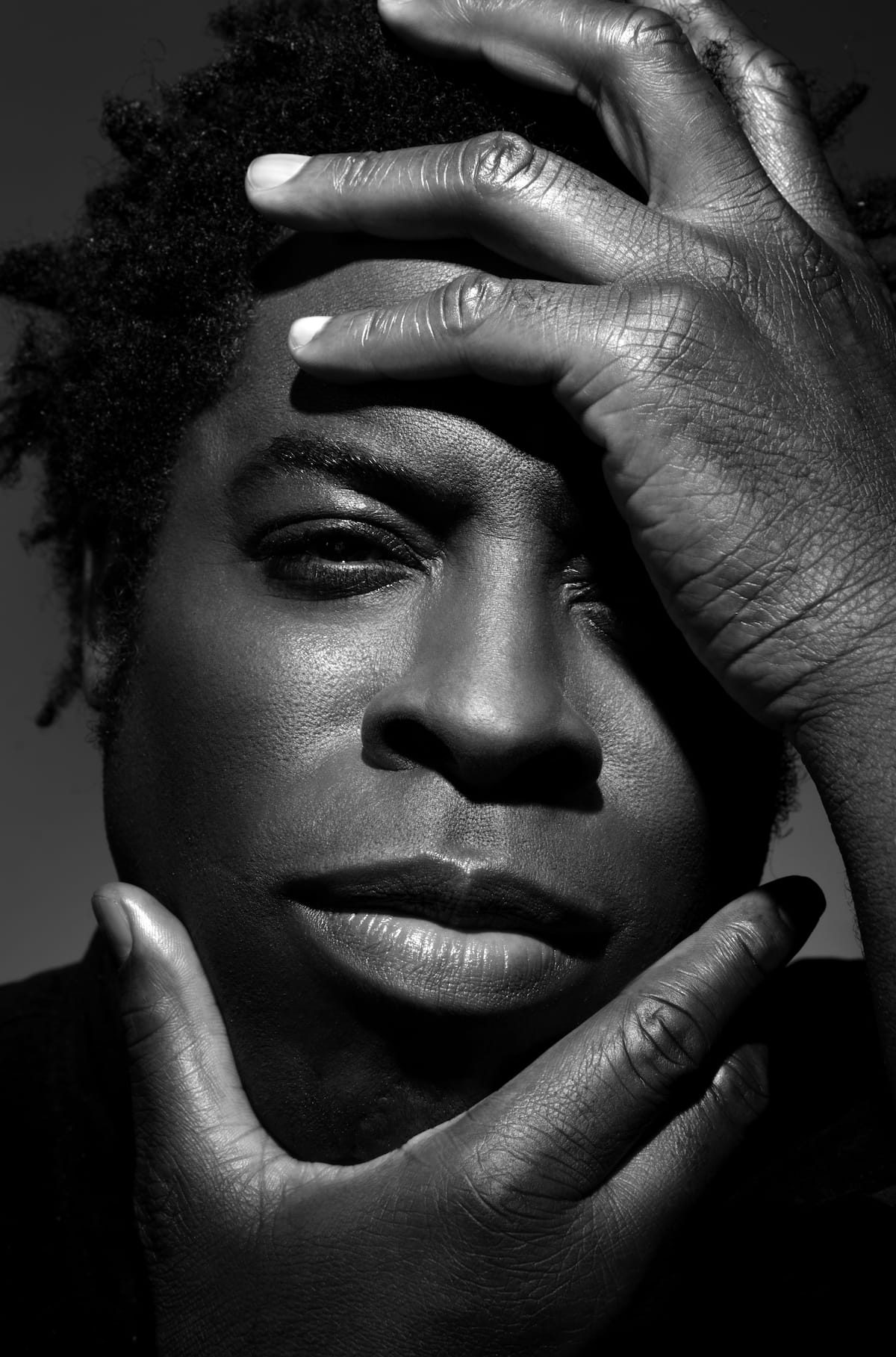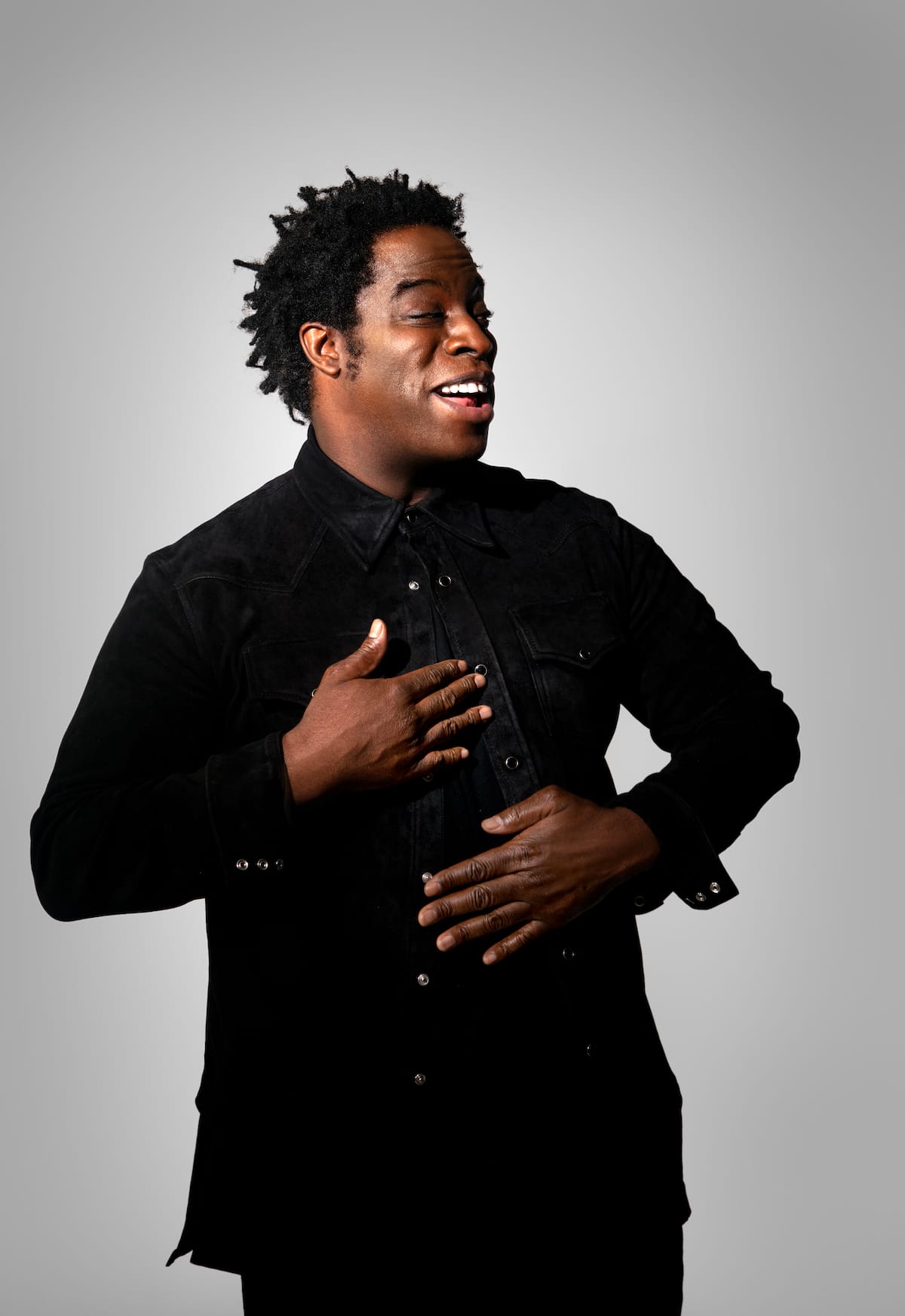According to the Bible, Moses was born in Egypt to Hebrew parents. Yet in the 1956 classic Ten Commandments, the prophet is played by Charlton Heston, an Illinois-born actor with Scottish ancestry. In the 1977 TV series Jesus of Nazareth, the eponymous savior—painted bronze in the New Testament—is embodied by hueless English actor Robert Powell. There was also Mel Gibson’s 2004 movie, which stars Swiss, Irish, and Slovak-mixed actor Jim Caviezel as a controversial, yet passionate Christ. And so on.
“In Andrew Lloyd Webber’s Jesus Christ Superstar, the only Black character was Judas!” says filmmaker Jeymes Samuel, speaking virtually from Los Angeles. Hollywood has a penchant for bleaching scripture in questionable ways, the caucasity of which prompted Samuel to dedicate his latest motion picture to countering centuries of whitewashed history. Truth is, despite the Catholic Church’s agenda, the Bible so Black.
The Book of Clarence (in theaters Jan. 12) is set in ancient Jerusalem during the days that lead up to the crucifixion of Jesus. Yet Mary’s firstborn is merely a background player in this period piece, which stars LaKeith Stanfield, RJ Cyler, Omar Sy, Alfre Woodard, Teyana Taylor, and other familiar faces. (Stanfield and Cyler return from Samuel’s 2021 Black spaghetti western, The Harder They Fall). LaKeith plays Clarence—as well as his twin brother, Thomas the Apostle—a young hustler who is as misguided as he is misunderstood. Blind to the power of faith, Clarence wants Jerusalem juice just like that beloved wooly-haired dude. It’s why Jeymes Samuel introduces his lead character from an uncharted intersection of The Old Testament and Get Rich or Die Tryin’.
Aside from his Kehinde Wiley approach to historic storytelling, what makes Jeymes a singular auteur is his penchant for obsessing over his visuals as much as the score. An accomplished producer and songwriter—who happens to be singer Seal’s younger brother—Samuel, under the alias The Bullitts, has collaborated with everyone from Rosario Dawson to Jay-Z (who is also an executive producer on The Harder They Fall and The Book of Clarence). Samuel not only croons throughout his latest epic, he also produced the entire soundtrack, which features Lil Wayne, Shabba Ranks, D’Angelo, Buju Banton, and Hov himself.
A couple weeks before Jesus’ alleged birthday, LEVEL tapped in with Sir Samuel for a spirited convo that covered God’s Son being the first superhero, clout chasing, and the fact that Jeymes has heard more unreleased Jay-Z bars than the average person. Tarantino could never.

LEVEL: You say you’re not committed to one particular religious denomination. What initially drew you to biblical films?
Jeymes Samuel: Growing up in western civilization, we would watch those movies come Christmas and Easter—Ten Commandments, Ben-Hur, Jesus of Nazareth. You’re loving the performances and the stories; the days of miracles and high adventure. Then, as you get older and become more life aware, you look at those films and don’t see yourself. To the point, as much as I loved Ben-Hur, as much as I revere Charlton Heston as an actor, I don’t know anyone who looks like that. My desire was to make a movie that resembled the area that I grew up in, but transposed to the Bible days; to tell a biblical epic, but have a timeless tale woven through and show how close those two worlds are, whether it was ancient Jerusalem or a hood in New York or Brazil.
Before you became a brilliant songwriter, singer, and director, you were slinging herb in your hood like Clarence. Is that what you’re telling me, Jeymes?
I would never admit to any crime I was involved in. I regard myself as an intelligent hoodlum, word to Tragedy [Khadafi] [Laughs]. Word up to the whole Queensbridge. But we were just kids growing up in the hood. When I read about David and Goliath, they don’t speak about their riches. It’s just tales. A lot of these characters come from the land of the have-nots.
“In the trailer you see [Jesus] stop the stones [midair] and people say, “Oh. That’s like 'The Matrix.'” No, The Matrix is paying homage to Jesus. Neo, the messiah, is a Jesus story. I’m just giving it back to Jesus.”
The Bible doesn’t paint Jesus as a rich man.
He wasn’t rich! He was a carpenter. But when [Hollywood] shows us those stories, we don’t necessarily relate to the visual landscape. We don’t necessarily relate to Victor Mature. Personally, I just don’t believe a pharaoh in Egypt looked like Yule Brenner.
Related: The 5 Most Shameless White Savior Roles in Film, Ranked
You made the villain of this film Rome rather than the Catholic Church, which, historically speaking, commissioned the artwork that presented Jesus as European. Was that distinction intentional?
It was. I wasn’t passing commentary on the Bible itself. In those days, Rome was the biggest colonizer. They were going everywhere and colonizing—and not in the most friendly manner. I wanted to show that Romans would crucify people in mass. Hundreds of people. At the end of Spartacus, Jean Simmons sees Spartacus on the cross and she looks down and it’s just crucifix after crucifix. The Book of Clarence is a nod to that movie.

I love how you tease the idea of a white Jesus who isn’t actually so.
Our grandparents’ [generation’s] obsession with a white messiah—I just did a jovial nod to their image of a white messiah. In our house, we had a 3D picture of white Jesus being crucified. Up until now, I don’t know why they made that picture 3D. It was super scary as it followed you around the house.
Maybe that was the purpose.
To me he’s all colors. I believe in the walk of Jesus. But because I didn’t have that all-color representation… I depicted him how I would see myself.
"We are living in a society where everyone seems to be trying to prove that they’re something that they’re not."
You refer to Jesus as the first superhero. I found that quite profound.
In the trailer, you see him stop the stones [midair] and people say, “Oh. That’s like The Matrix,” and I’m like, “No. The Matrix is paying homage to Jesus.” Neo, the messiah, is a Jesus story. I’m just giving it back to Jesus. But yeah, he’s the first superhero. He raised Lazareth from the dead and turned water into wine.
You’ve also said biblical cinema is a hibernating genre. Why do you think that is?
I honestly don’t know why Hollywood stopped making biblical-era epics. Because those movies made a lot of money. I miss those stories of innocence. Both of my movies haven’t had a single cell phone in it. I’ve done two movies—in both of those movies, there isn’t an ounce of electricity. Yet look at the similarities between those days and today.

The Book of Clarence reminds me of a very modern term: clout chasing. Were you using this film to make a statement about today’s society?
Absolutely. A huge statement. Clarence’s idea to promote himself as a false messiah is clout chasing of the highest degree. You’re bang-on with that. We are living in a society where everyone seems to be trying to prove that they’re something that they’re not with the advent of social media. But I personally don’t think anything has changed. We just didn’t have social media before. People didn’t have the device or means to show their false representation of self.
I believe how we use social media is reductive. Not social media in nature, but how we use it. You can’t go out to eat no more without your friend taking a picture of the plate and posting it to the whole world. I’m scrolling Instagram—I don’t care what your meal is. Clarence could’ve been the very first clout chaser. Except he has a purpose for doing it. He’s just a non-believer at the time and thinks [Jesus] is a hustle. So [he’s like], “Let me get this hustle in myself because I want to change the life of myself and my mom.” What we experience in 2024’s clout chasing is for much more selfish reasons.
"If [Jay-Z] calls me and he's on the treadmill, I'm gonna get new bars. That guy's running and composing the illest rhymes you've ever heard."
Other than the fact that you and Shawn Carter are extremely talented Black writers and visionaries, what’s the connection between you two that people can’t see?
For one, we’re brothers. We speak all the time. So because we’re both creatives, it’s just an organic bleed into film and music, into art of all types. I’m a floor-to-the-ceiling creative. I wake up and create pretty much until I go to sleep, which is why I’m able to write, direct [film], and then write, compose, produce, and perform all the songs for the soundtrack. But Jay-Z’s exactly the same. This guy wakes up at, like, five in the morning and he’s creating from the start. If he calls me and he’s on the treadmill, I’m gonna get new bars. That guy’s running and composing literally the illest rhymes you’ve ever heard. Months later I’m like, “What happened to that rhyme that went da-da-da?” He didn’t do anything with it. He just put it to the side because he doesn’t use a pen. Our relationship is one of brotherhood, laughter and love. It just bleeds into The Harder They Fall and The Book of Clarence.
Related: LaKeith Stanfield’s Toughest Role Is All of Himself
Talk to me about directing LaKeith as twin brothers. What did he bring to the production that you didn’t anticipate?
I always knew LaKeith was Clarence from the day we met. I knew this movie did not work without LaKeith playing those two characters. What I didn’t anticipate was how much more LaKeith would bring to the role. LaKeith is an artist. He’s a musician and a filmmaker. So his artistic sensibilities are so melodious—the tones he uses for Clarence to the tone he uses for Thomas. I never thought about that stuff. I wish every director could work with him. Directing LaKeith Stanfield is like [inhaling fresh] air. I would tell him things and he already had the idea. I would have never expected Thomas’ character to be so different from Clarence, but so the same. When we wrapped on Thomas, everyone started clapping. LaKeith—dressed as Thomas—burst into tears. You saw Thomas being released. The man embodied two people.
I love that Clarence isn’t the person he’s perceived to be by others. Normally in a movie, the character is that reputation and then they overcome some obstacle towards a tipping point, or turn from caterpillar to butterfly.
And I love that you say that. Clarence is not a bad guy. He’s actually a really dope individual. Sometimes [he] would do something that’s misguided, but his heart is always in the right place. It’s why I love this film and I love this character. I’ll tell you something, brother: When filmmakers talk about their films, it’s very mature. You never hear Christopher Nolan say, “You have to go to see Oppenheimer. It’s f**king great!” Hats off to all of the directors who speak really maturely about their offerings. I’m not. This movie is dope! Go see it on a big screen. It’s an amazing flick.
